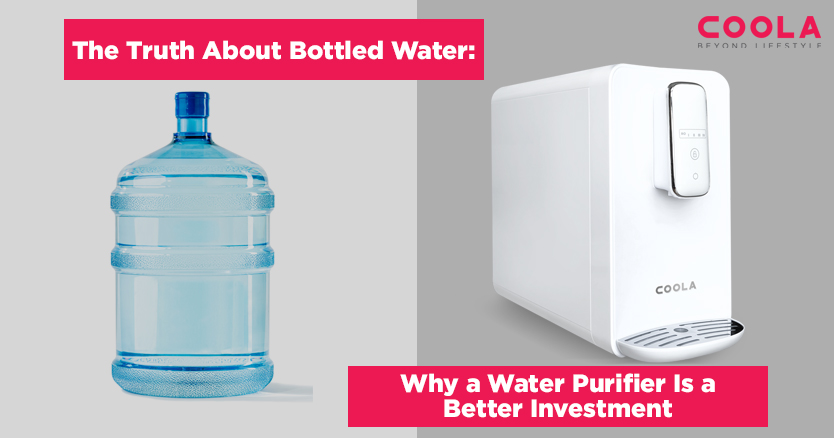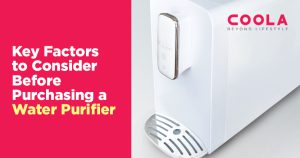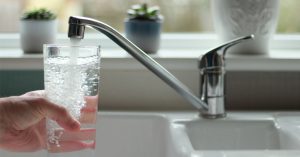People are consuming more bottled water than ever before, but is it really the best option? You may be under the impression that bottled water is a more productive, affordable, and safe alternative to tap water. However, this is not true.
In this article, we will discuss the facts about purchasing bottled water as well as the reasons why investing in a water purifier is a better option.
Bottled water may seem like a convenient, budget-friendly, and safe option, but the truth is that it can be a risky choice. Here are some facts you should know:
- Bottled water is often sourced from municipal water supplies, so you may not get the high-quality water you expect. This only puts you at risk for some harmful substances and contaminants that can be found in tap water.
- Bottled water can be expensive, especially if you drink it regularly. Depending on the bottled water brand and where you purchase one, a 350 mL can range from ₱15 to ₱50. Surely, this may not seem like a lot of money, but considering that the average person consumes about 2 liters of water a day, this small amount could add up fast.
- Plastic bottles are bad for the environment. Not only is bottled water heavy on your expenses, but it also poses a negative effect on the planet. As we all know, plastic bottles can take hundreds of years to decompose, contributing to environmental problems.
- Not because you purchase bottled water, its safety is guaranteed. Some bottled water brands contain contaminants like bacteria, chlorine, and other chemicals, so they are not really safer and cleaner compared to tap water.
- The Cost of Bottled Water
Bottled water can be extremely costly, especially when you consider that the price per gallon can be several times higher than tap water. If you drink bottled water regularly, the cost can quickly add up. Let’s say a common gallon of water in the Philippines is priced at ₱500. If you drink two gallons daily, you could spend up to ₱365,000 a year on bottled water alone.
Environmental Impact of Bottled Water
The environmental impact of bottled water is also a concern. Plastic bottles can take hundreds of years to decompose, and many end up in landfills or oceans, causing pollution and harming wildlife. Additionally, producing, transporting, and disposing of plastic bottles requires significant energy and resources, contributing to climate change.
In fact, according to the United Nations Environment Programme, an estimate of one million plastic bottles are purchased every minute, while up to five trillion plastic bags are used worldwide every year.
Health Concerns with Bottled Water
While bottled water may seem like a safer choice, that’s not always the case. Some bottled water brands may contain contaminants like bacteria, chlorine, and other chemicals that can harm your health. Additionally, plastic bottles can leach chemicals into the water, especially when exposed to heat or sunlight.
Advantages of a Water Purifier:
Investing in a water purifier can offer several advantages over bottled water, including:
Higher-quality water: A water purifier can remove impurities like bacteria, viruses, chlorine, and other chemicals, ensuring you have access to safe and clean drinking water.
Cost-effective: A water purifier can save you money in the long run, as you won’t have to keep buying bottled water.
Environmentally friendly: A water purifier can reduce plastic waste, contributing to a healthier planet.
How to Choose a Water Purifier
When choosing a water purifier, consider the following factors:
- The type of contaminants you want to remove from your water. First, identify your home’s water source. To choose the best water purifier that works for your household, you have to understand what contaminants may already exist in your water.
- Next, you have to set a budget. Water filters are priced differently. Keep in mind that investing in a water purifier should provide you with convenience and not have a negative effect on your finances or budgeting.
- It’s important to choose a water purifier that meets your specific needs and provides the level of water quality you require. Every filter has its own role, so no filter can eliminate all water contaminants.
- You should also consider the after-sales service and maintenance. Buying a water purifier entails that you also have to change the filters regularly. An effective after-sales customer service would assist you with everything you need in relation to the water purifier you bought.
The truth about bottled water is that it is not as safe, affordable, or environmentally friendly as you may believe. Investing in a water purifier is a better choice for your health, your wallet, and the environment. With a water purifier, you can enjoy safe and clean drinking water without the cost and environmental impact of bottled water. So, make the switch today and invest in a water purifier that meets your specific needs.
The COOLA Water Purifier has a 4-stage filtration system with Reverse Osmosis Technology from the US that terminates at around 0.0001 microns. This results in effectively removing bacteria, germs, viruses, lead, pesticides, and other harmful substances from the water.
Contact COOLA right away to learn about all of its great features and to find out how you can ensure your family’s health and safety through clean and purified drinking water every day.
Frequently Asked Questions:
Q: Is bottled water safer than tap water?
A: Not necessarily. Bottled water may contain contaminants like bacteria, chlorine, and other chemicals, while tap water can be treated to remove impurities.
Q: Are all water purifiers the same?
A: No. Different types of water purifiers use different methods to remove impurities from water. It is important to choose a water purifier that meets your specific needs.
Q: Is a water purifier a good investment?
A: Investing in a water purifier can save you money in the long run and provide you with high-quality, safe drinking water.



